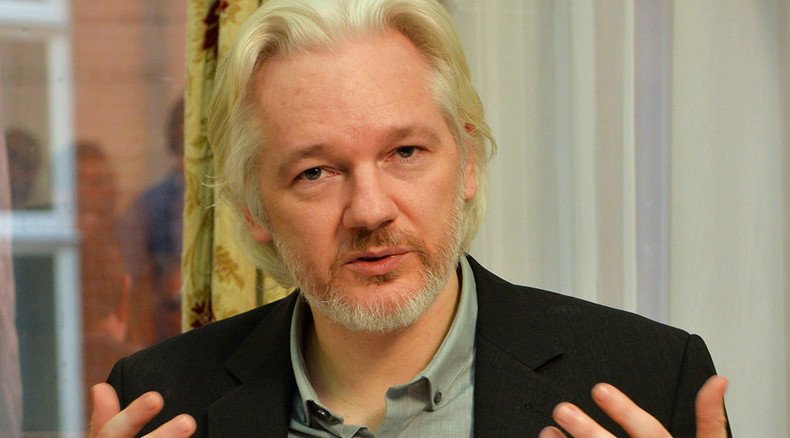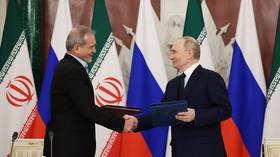‘Campaigners are key to getting secret TPP and TTIP trade deals published’

The fact that WikiLeaks is offering €100,000 for documents that reveal the details of the secretive TTIP shows the US and EU are attempting to block real information on this, Matteo Bergamini, director of Shout Out UK, told RT.
WikLleaks has launched a bounty hunt for the secretive Trans-Pacific Partnership and the Transatlantic Trade and Investment Partnership documents. The terms of the trade deals, including the loss of sovereignty for participating countries, have been kept away from the public.
RT: WikiLeaks has published the secret “core text” related to the controversial trade agreement which has been negotiated behind closed doors between the US and the EU. What’s your take on that?
Matteo Bergamini: It is interesting. I’ve been following the TTIP thing quite a bit. For me it is welcome news that there is an organization now that is doing something to try uncover the secrets that TTIP holds, which, in my opinion – will be quite devastating democracy in the western world. But it is also quite interesting to see that the ex-Finance Minister [Yanis Varoufakis] in Greece is taking part in this, which is quite interesting considering what happened to Greece.
RT: Why is the information is being kept in secret by involved governments? Do they have something to hide?
MB: Simply because the governments in Britain and the US, but I’m sure other governments are involved, know that if what is in there is leaked, then the people will probably be incredibly upset – I’m being polite – and that is what’s worrying. The fact that WikiLeaks is going to the extent of offering €100,000 for documents around this treaty clearly shows that they are keeping a very, very big lockdown on anybody that has any sort of real information about this treaty. It’s insane that it is so secret; it is one of the biggest treaties in modern history for western governments, and yet the people know nothing, and it is claimed to be a democracy. It’s maddening.
READ MORE: TISA WikiLeaked: Winners & losers of multinational trade deal
RT: What sort of data, do you think, that could be?
MB: Your guess is as good as mine at the moment, because we know very little. As far as I can understand from the information available to me, it’s quite worrying to believe that potentially this treaty will allow corporations, businesses to sue governments that have laws that stop them from making money, and in a lot of ways will stop governments from being able to legislate around businesses and health & safety, and all the rest of it.
Effectively, at the moment, obviously, governments are more powerful than businesses in regard to making laws and so forth. This treaty could tip the balance towards profit-making and undemocratic organizations, which would be a massive, massive blow to democracy.
RT: What do you think will be the outcome of this situation? Are we going to see more revelations? What is the reaction of people in the US and the UK?
MB: Yes, I mean not in the short term. With regards to the Edward Snowden thing, the NSA and all the rest of it, it shocked people, but I think not enough. Although it is very shocking – spying still does carry on, there is a massive debate, at least in Britain around the issue of spying, of the NSA, and the things that British government have been doing involving that. So there is now a growing public discontent with that, and a growing debate around it. I think the release of documents that TTIP will force more people into getting involved politically, because a lot of at the moment in the western world especially in Britain and across, we have very, very high apathy towards politics. But people are becoming more involved because they realize that if they don’t get involved, self-interested parties like big business will effectively outmaneuver them and effectively erode democracy for their own private gain. I think this will have a beneficial aspect for democracy, simple because more people will get involved, because more people will be annoyed, angry.
RT: Are people’s voices powerful enough and could have massive impact on TTIP’s actions?
MB: The short answer is yes, simply because businesses aren’t all powerful. We are made to believe they are. The reason why these things are in secret is because they know people hold a lot of power; people’s voice holds a lot of power. And businesses aren’t – this sort of unilateral idea that everybody would think the same and they all want these same things.
You’ve seen for example, you’ve seen for example, if you remember the SOPA bill (Stop Online Piracy Act) that tried to go through Congress in the US quite a while ago. That was stopped by the people’s voice, Google, and Wikipedia both also going on blackout for 24 hours. So businesses aren’t in complete agreement about all of these things that are going on. I think if the people voiced their opinion more about their anger toward these issues, more businesses that are against this sort of stuff will see that there is public support. In the end, they want good PR, because that gives them more money; in the long run, because they get more customers from good relations with the people.
So in a lot of ways it does benefit some of the businesses, but if people have no idea what TTIP is, or what it stands for, how can they possible get angry about it? Which is why it’s important for organizations like WikiLeaks to fight for this information to come out. It’s not just WikiLeaks - I’m sure the Guardian is doing the same thing, and there are tons of other publications. But it’s important that this information comes out. Yes, it will have a massive impact. People will then start to debate about this stuff, because they will know exactly what’s going on. And then they can agree, if they agree, or not. But at the moment there is nothing.
RT: So you think WikiLeaks and their supporters will finally succeed?
MB: I don’t know if I want to become cynical, but I would like to think they will: WikiLeaks, as well as The Guardian and various other media publications, have always managed to win these battles. With the Edward Snowden thing, and with spying they managed to blow that whole thing out in the open. With the TTIP so far they have been unsuccessful, but then so has this treaty. It’s been going on for quite some time, they haven’t implemented it yet. There is still everything to play for, if you want to say that.
I believe they will succeed. They have done so far: they haven’t succeeded in stopping spying, but they have succeeded in exposing it. So I think they will do the same thing. TTIP may go through, and I think it will. But they may be able to expose what it is before it does go through to create a public debate. In the end what needs to happen… is that people need to find their voice.
That is a problem across the West: People don’t have a voice anymore. They feel apathetic, they don’t feel interested. Partly because of constant government secrecy and the constant scandals that have come out. What people need to realize is that if they don’t get involved these things they don’t want to happen will happen regardless if they are involved or not. More people doing so – talking about these things – will put pressure on the governments to act in the way they people want as opposed to corporate interests.
The statements, views and opinions expressed in this column are solely those of the author and do not necessarily represent those of RT.
The statements, views and opinions expressed in this column are solely those of the author and do not necessarily represent those of RT.













